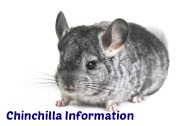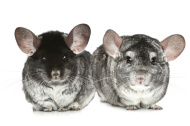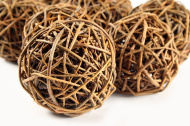|
|
|
|
wsp_rte_replace_marker?

|
Chinchillas are known for their large ears and soft, luxurious fur. Chinchillas make charming pets, but they are naturally skittish.
Diet - Chinchillas are herbivores and they require a diet high in fiber. Provide unlimited access to fresh grass hays, such as timothy and oat hay. Alfalfa hay is very rich in calcium and protein and should be fed to young, growing animals. A high-quality chinchilla pellet should make up 30-50% of the diet. The pellets should not contain seeds or colored pieces. Treats, such as fresh carrots and green vegetables, should never make up more than 5-10% of the diet. Make clean, fresh filtered or bottled water available at all times. Water is easily provided in water bottles placed at a level your chinchilla can reach comfortably. Clean bottles regularly. For more information on Chinchilla diets, click here to visit the Oxbow Animal Health Website
Habitat - These active, acrobatic animals require a lot of space. A large multi-level cage is recommended since chinchillas like to climb and jump in both horizontal and vertical directions. Select a cage constructed of a very small welded wire mesh to prevent leg or foot injury. An area of solid flooring should also be available, as well as drop pans below the cage to facilitate cleaning. Since chinchillas are shy animals, they also require a hiding place. Use something that is made of non-porous materials that can be cleaned and sanitized well or an item that can be easily replaced like a cardboard box. In the wild, chinchillas are solitary creatures, so it is not recommended to have multiple chinchillas in the same cage. Male chinchillas will fight each other for a mate, and two females may also fight. Chinchillas thrive at a temperature range of 64-72°F. Chinchillas do not tolerate heat or humidity. These nocturnal rodents cannot sweat, and they are prone to potentially fatal overheating. Provide wooden blocks and clean, dry, cardboard rolls for chewing. Chinchillas enjoy ledges, boxes, sticks, and other perches. Select exercise wheels with safety in mind. Small wheels can hurt the chinchillas' backs. Select a solid running surface to prevent limbs or toes from being caught. Also avoid wheels with support bars (bars going from top to bottom on the wheel), as these can cause serious injury. Chinchillas must regularly dust bathe to remove oil and moisture from their thick fur. Provide dust baths at least once or twice weekly for only a short time to prevent a perpetual dust cloud in the cage. Dust baths must be large enough and deep enough to allow the chinchilla to roll around in the pan. Socialization - Any chinchilla let out of its cage for play and exercise should be fairly tame and used to being handled. Close supervision is required. Chinchillas are curious, and many things are investigated by biting into them to see if they are edible. Supervise your pet closely in a room that has been checked carefully beforehand. If handled frequently at a young age, chinchillas adapt well to humans. Other - Ingestion of feces is also a normal chinchilla behavior. Chinchillas produce cecotropes or “night feces” which are loaded with plenty of vitamins and other nutrients. Our staff would gladly speak to you if you have any further questions about your chinchilla. |




